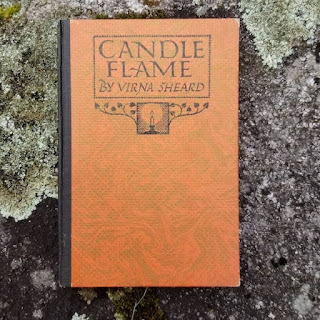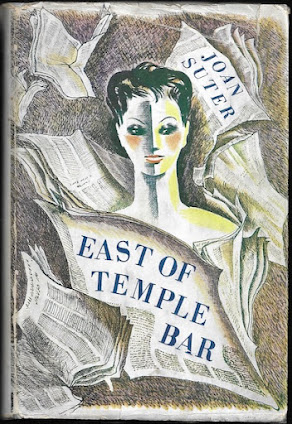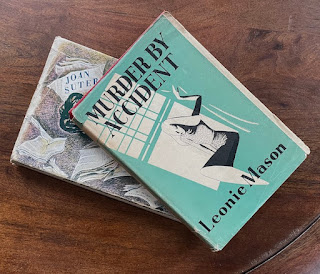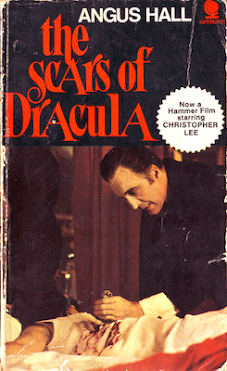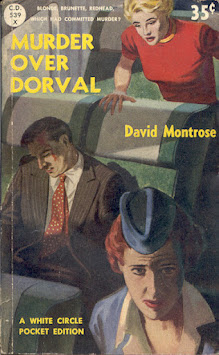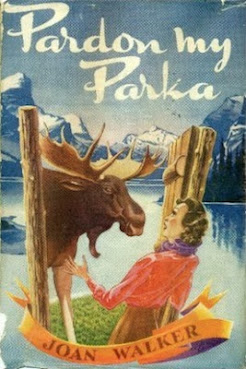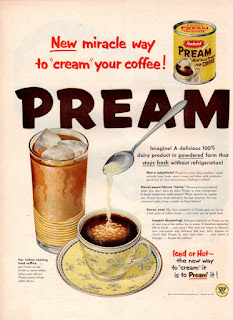01 May 2022
Is This the Dominion's Only Goose Girl Poem?
01 April 2022
Ten Poems for National Poetry Month, Number 1: 'Snow in April' by Marjorie Pickthall
Over the boughs that the wind has shaken,Over the sands that are rippled with rain,Over the banks where the buds awakenCold cloud shadows are spreading again.All the musical world is still,When sharp and sudden, a sparrow calls,And down on the grass where the violets shiver,Through the spruce on the height of the hill,Down on the breadths of the shining riverThe faint snow falls.Last weak word of a lord that passes—Why should the burgeoning woods be mute?Spring is abroad in the spiring grassesLife is awake in the robin's flute.But high in the spruce a wind is wailing,And the birds in silence arise and go.Is it that winter is still too nearFor the heart of the world to cast out fear,When over the sky the rack comes sailingAnd suddenly falls the snow?
21 March 2022
Joan Suter, Angus Hall, and the Collector in Me
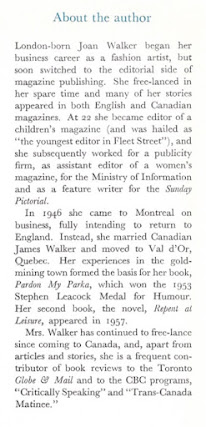 |
| Marriage of Harlequin Joan Walker Toronto: McClelland & Stewart, 1962 |
And then there's this, which may frighten some readers:
02 March 2022
Lunar Attractions; or, The Leacock I Like
Stephen Leacock
Toronto: Gundy, 1915
282 pages
 |
| Montreal: Pocket Books, 1946 First published by Dodd, Mead in 1930 |
“Isn’t it rather late to go there?” I protested.“My dear fellow,” said Mr. Butt warmly, “I don’t mind that a bit. The way I look at it is, here are these two young people, only married a few weeks, just moving into their new house, everything probably upside down, no one there but themselves, no one to cheer them up,”—he was wriggling into his raincoat as he spoke and working himself into a frenzy of benevolence,—“good gracious, I only learned at dinner time that they had come to town, or I’d have been out there days ago,—days ago-”
"Hullo," I called out; "it’s Butt." "I’m awfully sorry," he said, "we’ve gone to bed." "My dear boy," I called back, "don’t apologize at all. Throw me down the key and I’ll wait while you dress. I don’t mind a bit.""Just think of it," continued Mr. Butt, “those two poor souls going to bed at half past ten, through sheer dullness! By George, I was glad I’d come." ‘Now then,’ I said to myself, ‘let’s cheer them up a little, let’s make things a little brighter here.’"
“'He’s ill—some sort of fever—poor chap— been ill three days, and they never told me or sent for me—just like their grit—meant to fight it out alone. I’m going out there at once.” From day to day I had reports from Mr. Butt of the progress of Jones’s illness. “I sit with him every day,” he said. “Poor chap,—he was very bad yesterday for a while, —mind wandered—quite delirious—I could hear him from the next room—seemed to think some one was hunting him—‘Is that damn old fool gone,’ I heard him say. “I went in and soothed him. ‘There is no one here, my dear boy,’ I said, ‘no one, only Butt.’ He turned over and groaned.
“I do,” he answered. “It may be that it is something in my temperament, I suppose one would call it a sort of spiritual mindedness. But I think of it all constantly. Often as I stand here beside the window and see these cars go by”— he indicated a passing street car —“I cannot but realise that the time will come when I am no longer a managing director and wonder whether they will keep on trying to hold the dividend down by improving the rolling stock or will declare profits to inflate the securities. These mysteries beyond the grave fascinate me, sir. Death is a mysterious thing.”
 |
| New York: Dodd, Mead, 1956 |
This novel represents the last word in up-to-date fiction. It is well known that the modern novel has got far beyond the point of mere story-telling. The childish attempt to interest the reader has long since been abandoned by all the best writers. They refuse to do it. The modern novel must convey a message, or else it must paint a picture, or remove a veil, or open a new chapter in human psychology. Otherwise it is no good. SPOOF does all of these things. The reader rises from its perusal perplexed, troubled, and yet so filled with information that rising itself is a difficulty.
“They said they’d sell us tickets. But they questioned us mighty closely; asked where we wanted to go to, what class we meant to travel by, how much luggage we had to register and so on.”
"Stuck it out as best we could: stayed right there in the hotel. Poor Jones was pretty well collapsed! Couldn't do anything but sleep, and eat, and sit in the piazza of the hotel."
Object: A nicely-proportioned hardcover, very typical of its time. My first Canadian edition was purchased three decades ago at the annual McGill Book Fair (held in Redpath Hall, mere metres away from the university's Leacock Building). Price: $1.00. At the end of the volume is found three pages of advertisements for the author's other books: Arcadian Adventures with the Idle Rich, Behind the Beyond, Nonsense Novels, Literary Lapses, and Sunshine Sketches of a Little Town. These are followed by an advert for The International Studio magazine.
Sadly, but unsurprisingly – it was published in 1915, after all – my copy lacks its dust jacket (above).
Should I have expected more for a dollar?
It once belonged to a G.R. England. Going through the 949 Englands in the 1921 census, I find Gordon England (age 19), Gaspard England (age 21), George England (age 51). Gosselin England (age 71)... and that's just Quebec.
Access: Moonbeams from the Larger Lunacy enjoyed several Canadian, British, and American editions before going out of print in the 'twenties. It returned in 1964 as #46 in the New Canadian Library, and remained in print well into the 'eighties. I once purchased a copy with the third series design at Eaton's in downtown Montreal, not 100 meters from the university at which Leacock taught.
Used copies of are both plentiful and inexpensive. If you've got the cash, the one to buy is offered at US$150 by a Milton, Ontario bookseller. It has the dust jacket.
01 February 2022
'February' by Marjorie Pickthall
25 January 2022
On the High Heels of Pleasure
Joan Walker
Toronto: Ryerson, 1957
284 pages
Thus grief still treads upon the heels of pleasure:Married in haste, we may repent at leisure.— William Congreve, The Old Batchelour (1693)
She wore a wheat-coloured Irish linen suit, with an ascot of tan silk stabbed by a delicate diamond brooch. A very new, rather small mink cape was slung over her arm. Beside her brown crocodile pumps there was matched rawhide luggage tagged with BOAC labels, "Montreal".
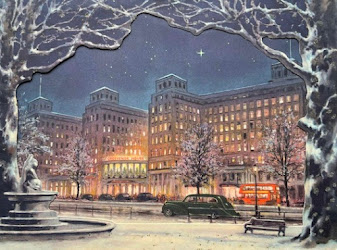 |
| Grosvenor House, c. 1940 |
Jane Nash was quite lovely. Brown shining hair and laughing hazel eyes like her brother's, only his weren't laughing now but strangely thoughtful. She like the way Jane looked as crisp as a lettuce in a green and white print with china bracelets heavy on one wrist and tricky white suède sandals strapped over incredibly fine nylons.
He swayed to where Veronica was sitting on on the edge of the bed, her eyes bright with tears of helpless laughter, He slapped her face. He said something in French which was neither civilised nor cultured.Veronica's face went very white, except for the red marks of his hand. She stared at him silently, incredulously.As a surgeon's daughter she knew had been on the verge of hysteria [sic]. She knew, too, that Louis had done the best thing possible by slapping her. But she also knew, with a cold certainty, that the reason for his blow had other causes and that he had no idea whatsoever of its therapeutic worth.It was like waking up and seeing a stranger. She had loved Louis deeply in England, but now he was unknown. An interloper in a loud, impossible blue suit, a belligerent, drunken, unattractive creature. She didn't love him at all.
22 November 2021
The Dustiest Bookcase: T is for Trueman
Stuart Trueman
Toronto: McClelland & Stewart, 1955
224 pages
I prefer my humour dark, which pretty much explains why I haven't read this mid-century comic novel. The jacket copy discourages:
What does it say about me that I have have no interest in a group of lovable characters? What does it mean that I don't want to read "a truly happy book."
Nothing good, I expect.
I'll be the judge of that... just not this year.
02 July 2021
Have Bomb – Will Travel
Tom Ardies
Calabasas, CA: Brash Books, 2021
Then came Hiroshima.
Then came Nagasaki.
And then, after writing a letter condemning the United States for its use of the bomb, Schuler disappeared. The missing scientist's name was quickly scrubbed from the history of the Manhattan Project. Morley didn't know if Schuler was alive or dead until the footage arrived on his desk. What's most disconcerting is that neither he nor the agency has any idea who sent it.
I enjoyed This Suitcase is Going to Explode even more than Their Man in the White House. The writing is tighter and the novel has a greater reliance on dialogue.
I do like dialogue.
Volrich raised his newly acquired pistol and sighted down the barrel. His finger tightened on the trigger and he began chanting out a deliberate count. "One... two... three..."Is that thing loaded?" I asked."Of course," Volrich said. "I thought that was one of the rules. 'You'll never kill anyone with an empty gun.'" His eye moved back to the gunsight. "Four... five..."Is it? I haven't looked in the rulebook lately.""Your problem," Volrich said. "One of your many problems..." He closed his eyes and squeezed as hard as he could. The hammer clicked on an empty chamber. "How long does it take to kill a man?"We had about a minute more to wait. I took a last drag and stubbed out my cigarette. "It all depends. But, I'll tell you one thing. You just took too long."
"You may need the gun, " I said the. "The best idea is not to think about it. If you take time to think it will be too late."Volrich removed his pipe. The stem made a small circular motion. "With all this protection...""It could happen, I said. "So don't count, huh? Don't think at all..."He looked at me with disgust.
I'm looking forward to getting to know him even better.
Object and Access: An attractive trade-sized paperback, the Brash Books edition is the first in 45 years. It was sent to me by the publisher, along with three other Ardies reissues. Having now read the novel – I'd never encountered a copy of a previous edition – I'm happy to add it to my collection.
This Suitcase is Going to Explode was first published in 1972 by McClelland & Stewart (Canada) and Doubleday (United States). Two years later, PaperJacks and Panther published Canadian and UK mass market editions. Curiously, it wasn't until 1976 that Fawcett issued the first American mass market. The publisher made up for the tardiness with a really cool hologram cover (right).
Used copies of Doubleday's American first are being offered online at prices ranging from US$3.00 to US$10.45, but all look to be in rotten shape. The much more common Fawcett is more expensive – something to do with that hologram cover, I expect. Decent copies hover in the ten to twenty dollar range, though some booksellers are asking for much more. Some joker in Florida wants US$100.94 for a 46-year-old copy he claims is "Brand New!"
The McClelland & Stewart, PaperJacks and Panther editions are nowhere in sight, though I once managed of capture this petite screenshot of the elusive PaperJacks edition:
My advice is to purchase the Brash Books edition.
A French translation, Une valise qui explose, was published in 1973 by Hachette. Are we to assume the nuclear weapon was retrieved from a baggage carousel?
No Canadian library has a copy of Une valise qui explose.
01 June 2021
Little Willie, Willie Won't Go Home
Toronto: McClelland & Stewart, 1977
57 pages
What I admire most about Ted Allan was his ability to take an idea and rework it repeatedly, in the process supporting himself, his wife, and his children. "Lies My Father Told Me," a very, very short story – 782 words – was written on the instant for a 1949 issue of The Canadian Jewish Congress Bulletin. It went on to become a radio drama, a television drama, a stage drama, and a feature film for which Allan earned an Oscar nomination for Best Original Screenplay.
On March 29, 1976, the evening of the award gala, Allan joined Federico Fellini (Amarcord) and Robert Towne (Shampoo) in learning that he'd lost to Frank Pierson, who'd written the script for Dog Day Afternoon. The bad news came from Gore Vidal:
The very same year that "Lies My Father Told Me" appeared in The Canadian Jewish Congress Bulletin, Allan dashed off a pseudonymously published pulp novel, Love is a Long Shot, for News Stand Library, the paperback imprint of Export Publishing. Thirty-five years later, he rewrote the novel and managed to place it with McClelland & Stewart. It won the 1985 Stephen Leacock Memorial Medal for Humour. In between the two different versions, as "John Smith," Allan adapted the plot as a CBC movie titled Love on the Nose. As I understand, he later shopped another adaptation, this one titled Love is a Long Shot, around Hollywood.
All this brings me to Willie the Squowse, which is by far the shortest and most enjoyable book I've read this year. It began as a story written for his children – unpublished, it would seem – which was bought by George Pal. It was reimagined by Hungarian expat László Vadnay as The Great Rupert. Look carefully, and you'll see Allan's name on the movie poster:
In 1950, the year The Great Rupert was was released, the CBC broadcast Allan's radio adaptation. I find it charming. You can hear it through this link.
Twenty-three years after that, Allan entered "Willie the Squowse" in the 1973 Times Children's Story Competition. It earned earned second place, was published in The Times Saturday Review, and was subsequently included in The Times Anthology of Children's Stories (London: Cape, 1974). I believe it's on that strength of this late notice that, at long last, "Willie the Squowse" appeared as a book on its own. Printed in Great Britain, all indications point to my McClelland & Stewart edition as a Cape co-publication; no effort has been made to alter the anglicisms.
Just the thought that the money is near brings the Pickerings peace of mind:
During their walks around the the park they noticed two trees they'd never noticed before. They heard music they had never heard before. And most of the neighbours seemed to be very neighbourly, which was something else they had never noticed before. They didn't worry when it rained and they didn't worry when the sun shine and sometimes they giggled thinking how silly they had been to worry so much.What they don't know is that the money isn't there. For reasons I won't describe, Willie, who has taken up residence in the wall shared by the two houses, has begun pushing ten pound notes toward the new residents of his former home.
Because Willie the Squowse is so short I'll say no more, except to recommend it. I'm even more keen on Allan's 1950 CBC radio adaptation. Ted Allan played Joe in that production. As I say, he really knew how to make money from his work.
Sadly, I'm nowhere near so savvy.
Object: A very slim hardcover with black boards. The jacket is, of course, by Quentin Blake. I count fifty Blake illustrations in the book itself.
The complete text to Willie the Squowse can be found here on Norman Allan's website.
18 April 2021
Arthur Stringer Unshackled (then bowdlerized)
Arthur Stringer
Tooloona: A Novel of the North
Now, given Stendal's thing for Celina, one might think that he'd let matters lie and report the bigamy upon his return to New York. If so, one would be mistaken. Instead, Stendal does all he can to break up the couple, going so far as to bribe Ootah, the local shaman, into telling Tooloona that she must leave Winslow.
Stendal's motivation isn't spelled out until quite late in the novel, though I imagine more thoughtful readers than myself might spot it early on. From the start, Stendal sees Tooloona as primitive, a savage, an animal. Even after she saves his life, he compares her to a "faithful dog." Yet, inwardly, he struggles with his growing physical attraction to Winslow's new mate:
He failed to remember the day or the occasion when he first grudgingly admitted that her body was a beautiful one, that there was something arresting in even the triangulated face with dark tangle of lashes along the smooth cheek, too pale to be called a daffodil-yellow and too dark to be compared to a gardenia. But he had not been compelled to revise his earlier estimate of her. Nothing was gained, he knew by contending that she was an undersized and flat-faced barbarian who exuded the odor of fish oil. It was the white man's duty to be loyal to his white race.
"I'll concede that she has her own ars erotica. That's imposed upon her, I suppose, by her environment. She has to be warmer-blooded, in a country like this, just as she has to wear warmer clothing. You can write it down to Nature's plan for keeping the race going. Where the soil is thin there must be no mistake about planting the seed. I'm not a medical man enough to know how true it is that the Innuit vulva is more prominent and prehensile than the white woman's."
Or does it?
The Inuit are seen through the eyes of Stendal, Winslow, and Celina (yes, she eventually shows up). Stendal is a white supremacist. Winslow appreciates Inuit culture, but only when it doesn't cross his own beliefs. Interestingly, it's late-to-arrive Celina who has the greater recognition and appreciation of the Inuit – Tooloona above all. Though Winslow likes to think that he understands the Inuit of Iviut Inlet, his fragile ego leads to tragedy.
It wasn't the character I wanted dead.
* Stringer's 1927 novel The White Hands, in which a pair of Jazz Age sisters are sent off North Ontario, provides a bit of a twist on the premise.
** I can't help but note that in Helen Dickson Reynolds' truly strange He Will Return (1959), abandoned wife Constance Owen-Jones discovers her husband is still alive through a newsreel street shot.
Trash – and not "good trash" – but none the less will appeal to the vast majority of those who demand nothing but "escape" from their reading. The story of a New Yorker who escapes civilization by joining a tribe of Eskimos in the Far North, "buying" a mate, and evading the claims of wife and home; succeeds in making so-called civilized ideals sufficient excuse for immorality.– Kirkus, 15 June 1936
Oh, I don't know. Might it have something to do with being more attracted to women than interior decoration?
Odd that Harlequin describes Tooloona as a "dark savage." Stringer doesn't.
Access: The Wife Traders was first published in 1936 by Bobbs-Merrill and McClelland and Stewart. Tooloona followed later that same year. And then, of course, we have the 1955 Harlequin paperback.
Used copies of The Wife Traders begin at US$6.50 (the Harlequin paperback in "Good-Very Good" condition). As of this writing, only two are listed online. Get them while you can! The Bobbs-Merrill appears more common. Asking prices range between US$17.00 and US$85.00. Copies with dust jackets begin at US$30.00.
No copies of Tooloona are listed for sale online.
Library and Archives Canada, the Toronto Public Library, the London Public Library, Memorial University, the University of New Brunswick, Mount Alison University, Acadia University, Dalhousie University, the University of Toronto, McMaster University, Guelph University, the University of Saskatchewan, the University of Alberta, Simon Fraser University, the University of British Columbia, and the University of Victoria hold one edition or other of The Wife Traders.
No Canadian library has a copy of Tooloona.
Note: I was inspired to read The Wife Traders by the 1936 Club week.
